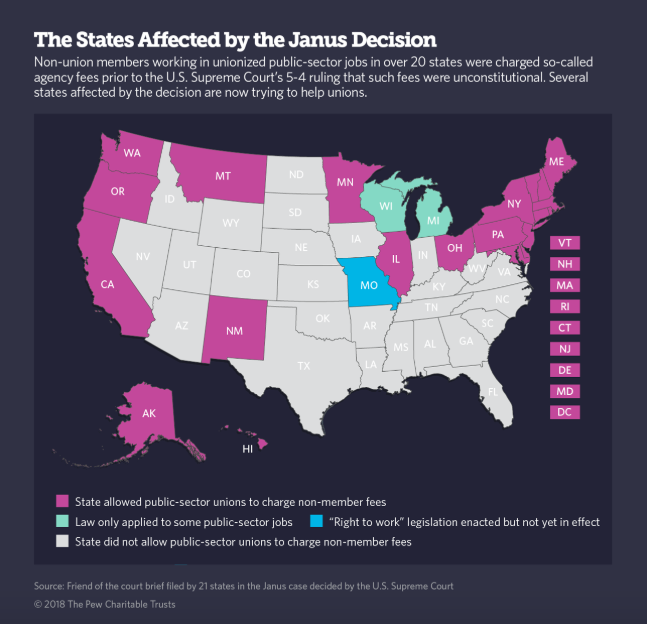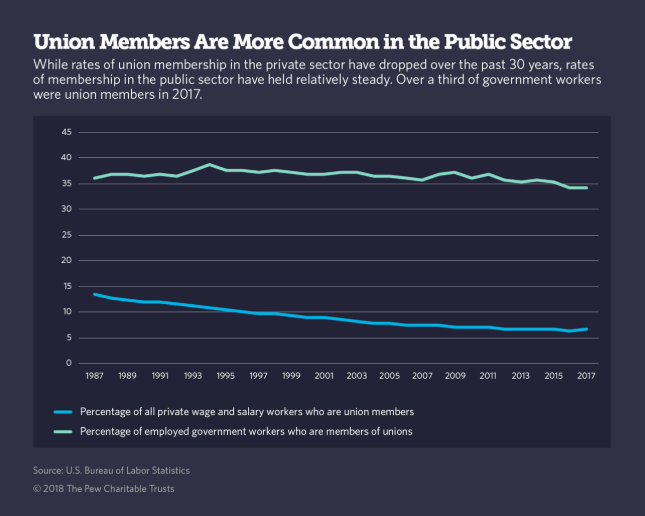Connecting state and local government leaders
Even before the Supreme Court ruled against public sector unions in June, eight of the 22 states that allowed unions to charge non-member fees took steps to cushion the blow.
This article was originally published by Stateline, an initiative of The Pew Charitable Trusts, and was written by Sophie Quinton. It is Part Three of Stateline's 2018 Legislative Review.
Public-sector unions will be watching to see how many members—and how much money—they’ll lose in the wake of a June U.S. Supreme Court decision that took away their power to charge non-members fees.
But even before the high court ruled, eight of the 22 states that allowed unions to charge such fees took steps to cushion the blow—often citing the broader battle between liberals and conservatives over organized labor and “right to work” laws.
“This is the tip of the iceberg. We are in the middle of a big, big fight nationwide. And it is just starting,” Democratic Gov. Andrew Cuomo of New York told a cheering crowd of union members before signing pro-union legislation in April. “But we’re going to be the state that shows how to mobilize, and how to win.”
The case focused on whether it was constitutional to require a government employee who is represented by a union but not a member to pay so-called agency fees to support union operations, including lobbying he doesn’t support. Illinois state employee Mark Janus brought the case against the American Federation of State, County and Municipal Employees.
The decision, which found that requiring agency fees violates the First Amendment, was widely predicted, given the court’s conservative tilt.

Perhaps no state has done more to boost unions than New York, the most heavily unionized state in the country. The law Cuomo signed gives unions a right to meet with new hires during the work day, requires public employers to give unions contact information for new hires and allows unions to give extra services to their members, among other changes.
New York City Mayor Bill de Blasio, also a Democrat, has signed a pledge to defend unions along with 21 other mayors nationwide. Former New York Attorney General Eric Schneiderman led 21 attorneys general in filing a friend-of-the-court brief in the Janus case that argued in favor of agency fees.
Lawmakers in New Jersey, Maryland, Washington and California also passed bills this session that guarantee some or all public-sector unions access to new hires and their contact information. Rhode Island lawmakers passed a bill that allows police and firefighters’ unions to stop representing non-members in grievance cases.
New laws in California and New Jersey—and an executive action in New York—limit outside groups’ access to public-sector workers’ contact information. And new laws in Hawaii, New Jersey and Delaware limit the time frame during which people can revoke their union membership.
But states with leaders fighting to protect unions are in the minority. Most states are now governed by “right to work” laws that eliminate agency fees. Twenty Republican attorneys general also filed a friend-of-the-court brief in Janus, urging the court to declare such fees unconstitutional.
The lawsuit that grew into the Janus case was originally filed by Illinois Gov. Bruce Rauner, a Republican. In a press conference on the Supreme Court steps, he celebrated the decision as a “historic victory for justice, and freedom of speech, and freedom of political affiliation.”
And the National Right to Work Committee and other groups that backed the Supreme Court decision say they’re prepared to sue to protect workers’ right to refuse to pay union fees.
“There are a lot of state laws that don’t comply with the Janus decision,” said Patrick Semmens, spokesman for the committee, a nonprofit advocacy group based in Springfield, Virginia. The group’s sister organization, the National Right to Work Legal Defense Foundation, represented Mark Janus.
For instance, some new state laws limit when people can opt out of paying union dues. “It must be an opt-in process, not opt-out,” Semmens said.
The Agency Fee Dilemma
More than a third of public school teachers, police officers, firefighters and government administrators were union members nationwide in 2017, according to federal statistics.
Unions have a legal obligation to represent everyone who works for the employer they’re bargaining with, whether those employees pay dues or not, said Catherine Fisk, a labor law expert and professor at the University of California, Berkeley.
“The question is how to encourage everyone to band together, rather than defect from the group in order to get a better deal for the individual,” Fisk said.
Enter the agency fee, which many states have allowed public-sector unions to charge non-members to ensure that everyone helps pay for the union’s work at the bargaining table. Some unions charge agency fees that are smaller than union dues. Others charge the same amount, unless agency fee payers request a refund. That’s the case for the United Federation of Teachers, an American Federation of Teachers local that represents New York City public school teachers.
UFT teachers pay close to $60 in dues twice a month. The union had over 122,000 active and over 64,000 retired members in 2017 and some 2,000 agency fee payers, according to its most recent filing with the U.S. Department of Labor.
Without agency fees, unions are likely to find themselves on shakier financial footing.
Alexander Hertel-Fernandez, an assistant professor at Columbia University’s School of International and Public Affairs, said the Janus decision’s impact may be analogous to the impact Michigan’s 2012 right-to-work legislation—which eliminated agency fees—had on public-sector unions.
Four years before the legislation passed, the four largest public-sector unions in the state were taking in over $206 million a year, according to data provided by Hertel-Fernandez. Four years after the law, their receipts had dropped by about 30 percent to $143 million.

To avoid such a decline, public-sector unions need to step up their efforts to recruit and retain members.
Many started to do so in the run-up to the Janus decision. American Federation of Teachers President Randi Weingarten told U.S. senators at a July event on Capitol Hill that over the past three years her union has held over a million one-on-one conversations with members to increase their commitment.
“What we are seeing is an amazing sense from our members that they are sticking with the union,” she said.
Left-Leaning Lawmakers Step In
Policymakers in Democratic-leaning states affected by the Janus decision have rushed to help unions make a better pitch to members and potential members.
The measure Cuomo signed in April, which was incorporated into state budget legislation, required public employers to promptly give unions contact information for all new hires and allow unions to speak to new hires during their first month on the job. It codified that workers may sign up to pay dues electronically.
It let unions exclude non-members from benefits and services outside negotiated contracts, such as representing workers in disciplinary proceedings.
And aspects of the law make it easier to retain union members, such as automatically reinstating dues when a member returns to work after a leave of absence or when a member who has left a union job takes another under the same employer within a year.
Cuomo, who is locked in a reelection battle, also signed an executive order in June that prohibits public employers from disclosing state employees’ personal information to outside groups, in an effort to stop anti-union groups from contacting workers and encouraging them to leave unions.
Finally, the New York Department of Labor released guidance that reassured public-sector workers and employers that the Janus decision changed only one thing: Public-sector employers can no longer deduct agency fees from a non-member’s wages.
Although many New York unions already had access to new hires, it was important to codify that in law, said Mario Cilento, president of the New York state AFL-CIO.
And the law protects unions from “the so-called free riders,” he said, by giving union members additional benefits. While some people may leave the union to get a little extra money in their paychecks, once they see what they’re missing, they’ll be back, he said.
Opponents of public-sector unions dismiss some of the new laws as insubstantial and say others raise legal concerns.
The National Right to Work Committee’s Semmens said new hire orientation requirements aren’t a big change. But he questioned laws that make it harder to leave unions whenever members want.
His organization supports laws North Carolina, Alabama, Oklahoma and Iowa have enacted in recent years that take the state out of the dues-collection business altogether, by banning public-sector unions from automatically deducting dues out of their members’ paychecks. All four states also have right-to-work statutes on the books.
Ken Girardin, a policy analyst at the Empire Center, a fiscally conservative think tank based in Albany, said the state Labor Department guidance conflicts with state law that requires dues to be deducted after the presentation of a signed union card. Lists of members provided by unions — which payroll offices often rely on — don’t cut it, he said.
“You still need something showing affirmative consent.” He said that Saratoga County, for instance, has signed cards on file for just 3 percent of workers the Civil Service Employees Association says are dues-paying members.
The Radical Option
Some lawmakers have proposed a more radical fix: to cut out the middleman and allow public-sector employers to directly fund unions without passing the money through employees’ paychecks.
Doing so would preserve funding for unions at no extra cost and give workers a tax cut, because dues payments wouldn’t be reflected in their paychecks, said Aaron Tang, an acting professor of law at the University of California-Davis who has popularized the direct reimbursement idea.
“It’s kind of a rare win-win-win to get things back to the status quo, before the Janus decision,” he said.
In New York, Assemblyman Richard Gottfried, a Democrat, is circulating a draft bill based on Tang’s idea. “I believe the direct reimbursement model can work and enable public-sector unions to survive and thrive,” he wrote in a letter soliciting co-sponsors.
Tang said lawmakers in four or five other states are weighing similar proposals.
The University of California, Berkeley’s Fisk said unions have several concerns about Tang’s idea. They worry that employees won’t feel represented by a union if it’s directly funded by the government. They worry that a union fund would fall victim to budget cuts in a downturn, when workers need union support most.
And unions aren’t happy with the optics. “It looks like what the right-wing critique of unions is — it’s a giant example of political corruption,” Fisk said, under which unions would campaign to get lawmakers elected and then get funding from those same lawmakers.
That’s how Gottfried’s proposal looks to the Empire Center’s Girardin, who called the idea “preposterous.”
The AFL-CIO’s Cilento was noncommittal. “Right now, we’re focused on the legislation that has passed,” he said, adding that he appreciates that lawmakers are trying to come up with new ideas.
Cilento said now that the legislative session is over and the Janus decision has been made, the AFL-CIO’s affiliated unions are watching and waiting to see if members leave, if they lose money, and what else will change. “Now that it’s here, we can say, OK, where are the trouble spots?”
Thanks to planning and organizing, public-sector unions are likely to lose less money than they would have had the decision landed without warning, he said. “We knew, at the very least, that with the legislation that was passed we’d be able to mitigate the damage.”

NEXT STORY: Some Wisconsin Schools Installing Gunshot Detection Systems



